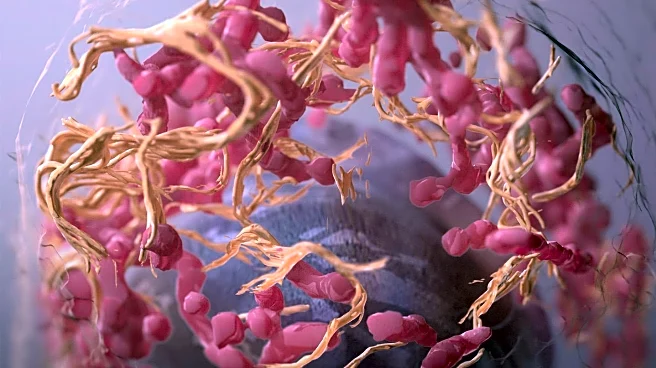What's Happening?
CatalYm has presented promising Phase 2 trial results at the European Society of Medical Oncology Congress 2025, showcasing the efficacy of visugromab combined with the PD-1 inhibitor nivolumab in treating muscle-invasive bladder cancer (MIBC). The trial,
known as GDFATHER-NEO, demonstrated that the combination therapy significantly increased the pathological Complete Response (pCR) rate to 33.3% compared to 7.1% with nivolumab alone. Additionally, the Major Pathologic Response (MPR) rate was enhanced to 66.7% from 21.4%. The combination also achieved a fourfold increase in radiologic Objective Response Rate (rORR), with 60% compared to 14.3% for nivolumab alone. The treatment showed good tolerability, aligning with the expected safety profile of checkpoint inhibitors. The trial involved patients who were ineligible or refused cisplatin-based chemotherapy, highlighting visugromab's potential as a new treatment option for MIBC.
Why It's Important?
The results from CatalYm's trial are significant as they offer a potential new treatment regimen for muscle-invasive bladder cancer, a condition with a poor five-year survival rate of around 50%. Many patients are unable to undergo aggressive chemotherapy due to age or comorbidities, and some refuse radical cystectomy. The visugromab and nivolumab combination provides a promising alternative with minimal side effects, potentially improving patient outcomes. This development could lead to broader applications in other hard-to-treat cancers, enhancing the efficacy of existing immunotherapies and offering hope to patients with limited treatment options.
What's Next?
CatalYm plans to advance visugromab into multiple Phase 2b studies, including trials for first-line metastatic non-small cell lung cancer and cachexia. The ongoing GDFATHER-NEO trial will continue with biomarker analysis and final safety assessments. CatalYm aims to rapidly progress its clinical program to improve outcomes for a wide range of cancer patients, leveraging the promising results of visugromab in combination with PD-1 inhibitors.
Beyond the Headlines
Visugromab's ability to neutralize Growth Differentiation Factor-15 (GDF-15) addresses a key mechanism of immune suppression and therapy resistance in cancer. By reversing these mechanisms, visugromab not only enhances anti-tumor responses but also mitigates cancer cachexia, a severe condition affecting many advanced cancer patients. This dual action could lead to significant improvements in quality of life and survival rates for patients with various types of cancer.















